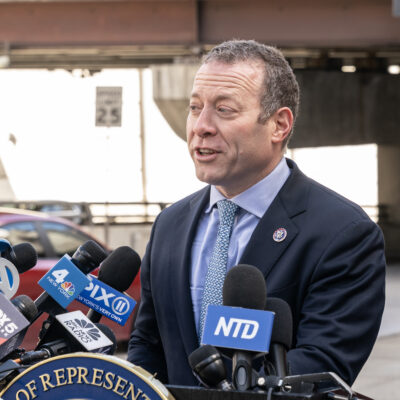Israel, Indonesia were on track to normalize ties before Oct. 7: sources
World’s most populous Muslim nation authorized an agreement to exchange trade offices with Israel, with a signing ceremony set for October 2023

Former Israeli Foreign Ministry Director-General Ronen Levy (left), former State Department Senior Advisor for Regional Integration Dan Shapiro, Joey Allaham, former Israeli Foreign Minister Eli Cohen and Andi Widjajanto, senior adviser to the president of Indonesia met in September 2023 in Jerusalem.
Israel and Indonesia had planned to announce the establishment of diplomatic relations in October 2023, a move that was delayed by the Hamas terror attack on Israel and subsequent war in Gaza, three sources involved in the negotiations told Jewish Insider.
Israel’s then-Foreign Minister Eli Cohen and departing Indonesian President Joko Widodo’s office approved a final draft of an agreement for the Jewish state and the country with the world’s largest Muslim population to exchange trade offices, as a first step towards full diplomatic relations, sources involved in the talks said.
October 2023 was a likely date for the official announcement, in conjunction with a planned meeting of the Negev Forum in the middle of the month, though November, when Widodo visited the White House, was also under consideration. Jakarta also tracked progress towards Israel-Saudi normalization, thinking that there would be less blowback if both happened within a short period, one source said.
Indonesia planned to open a trade office in Ramallah at the same time.
Andi Widjajanto, a senior adviser to Widodo, and Ronen Levy, then the director-general of the Foreign Ministry and one of the key Israeli players in the Abraham Accords, met in Jerusalem in September, along with Dan Shapiro, who at the time was the State Department’s senior advisor for regional integration, to finalize the text, as seen in a photo provided by one of the sources involved in the talks. New York-based businessman Joey Allaham played a key role in the negotiations, as well.
Though Shapiro was present and a small number of American officials were in the loop about the negotiations, Jakarta did not make any specific requests of Washington.
The countries reached a memorandum of understanding on Sept. 21 stating that the countries seek to “expand upon the Abraham Accords and promote peace, co-existence, mutual understanding, and respect among peoples of all faiths, ethnicities and nationalities.”
The MOU also stated that the sides support “improving the daily lives of the Palestinian people” and a peaceful resolution to the conflict.
Jakarta and Jerusalem agreed to open reciprocal liaison offices focused on developing bilateral relations, with an emphasis on economy, trade, technology, innovation and culture. In addition, the offices would be authorized to provide consular services.
Not written in the MOU, but in another document viewed by Jewish Insider, is an agreement that the sides would work on a mechanism to provide business visas to Indonesians and Israelis through the trade offices.
Indonesian President-Elect Prabowo Subianto, who won election earlier this month, has long supported normalization with Israel and, as defense minister, met with Israel’s then-National Security Adviser Eyal Hulata. However, as the negotiations took place months before the election, Widodo planned to finalize full normalization with Israel before he left office.
The sides also talked about removing Israel from Indonesia’s visa blacklist. Currently, tens of thousands of Christian pilgrims from Indonesia visit Israel each year, but it is very difficult for Israelis who do not have a passport from another country to visit the Southeast Asian archipelago state, which includes popular tourist destination Bali.
The draft agreement came after about four months of negotiations. Israelis who have found ways to do business in Indonesia, mostly in agri-tech, as well as American Jews who work with Jakarta, played a role in bringing the countries together.
After the Gaza war began, “the sides said we need to wait, because the timing is problematic,” a senior diplomatic source said.
Still, the source noted that Indonesia “did not say the agreement is off the table — it just was not the right timing.”
The senior diplomatic source said that Jakarta was convinced to establish relations with Israel following the success of ties between Israel and the UAE, and that Indonesia’s sizable Christian minority — about 29 million people or 10% of the population — is pro-Israel.
This story was updated at 2:30 p.m. ET to include part of the text of a memorandum of understanding between the two countries.










